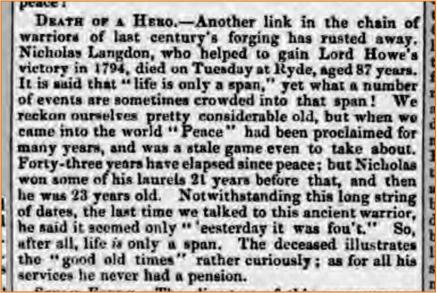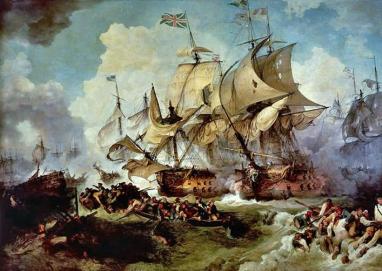Death of a Hero!
This obituary was originally printed in the Isle of Wight Observer on Saturday 25 November, 1858. It discusses the battle of the ‘Glorious First of June, 1795’
Lord Howe’s action, or the ‘Glorious First of June’ – Philippe-Jacques de Loutherbourg, 1795
Being deaf in the 1800s
Being deaf in the 1800s would have made life extremely difficult. Schools for deaf people were not yet common, despite the construction of some such establishments in the 1840-1850s. Our subject, Emma, is shown as being 33 at the time of the census, meaning she would have been born around the same time the schools were being built. However, the chances of Emma getting a specialised education in one of the first schools of this type would have been slim, assuming she had been born deaf, rather than developing the condition at a later stage in life.
There was general consensus in the 17th century and earlier that the ‘deaf and dumb’ community was of an ‘animal state’, and people who fell into this category were legally unable to marry, inherit, or other such ‘normal’ activities until the mid-1800s.
Visit the website address below to read an interesting article about the disability of being deaf, blind and/or dumb, and the impact it may have had on the creation of the classic novel Jane Eyre by Charlotte Brontë.
http://www.victorianweb.org/authors/bronte/cbronte/sharman10.html
The 1870 Education Act introduced by Parliament brought education to the forefront of the community.
The government invested enormous funding into education, and seemed to have been actively trying to increase the number of schools and ease of access for children to get a good start in life through education.
In 1880, schooling for children aged five to 10 was made compulsory, but it was not until the 1893 Elementary Education Act was introduced that education was also made compulsory for children who were blind and deaf.
As a result, more specialist schools were established to teach children with these disabilities.
However, according to the above article, in 1869 there were only 550 teachers of the deaf worldwide, so getting an education would have still been quite difficult.
Catherine Bearman
Catherine’s father is William Bearman, and his occupation, according to the marriage record of his only daughter in 1858, was listed as ‘late letter carrier’.
This job definition is an early form of postman, and perhaps the ‘late’ bit refers to the time of day he usually worked.

The Royal Mail was officially started by King Henry VIII in 1516, although it did not work in the same way, and customers were charged according to the distance the letter was to travel, rather than its size, as it is today.
More information and an interesting timeline of key events in the Royal Mail’s history are available at http://en.wikipedia.org/wiki/Royal_Mail#Timeline, and the company also has a dedicated archives centre in Essex.
http://postalheritage.org.uk/page/genealogy
Jonah Blanchard
On 11 August 1848 Jonah Blanchard was on trial at Wiltshire criminal court. His charge was ‘maliciously killing a sheep by poison’.
He was found not guilty, but other records on the page are also very interesting to read – for instance, three men were found guilty of burglary and sentenced to 20 years transportation.
Jonah Blanchard, Criminal Registers 1848
Baptism of twins Abraham & Sarah Jupe 23 July 1787 – North Mundham, West Sussex
“Abraham & Sarah Jupe twin children of Thomas Jupe baptised today.
N.B This is the third time I have been called upon by this poor man for the same occasion and all the six children are now living + six more”




